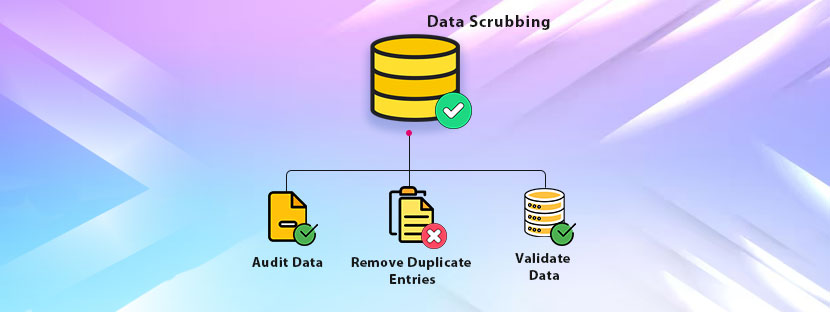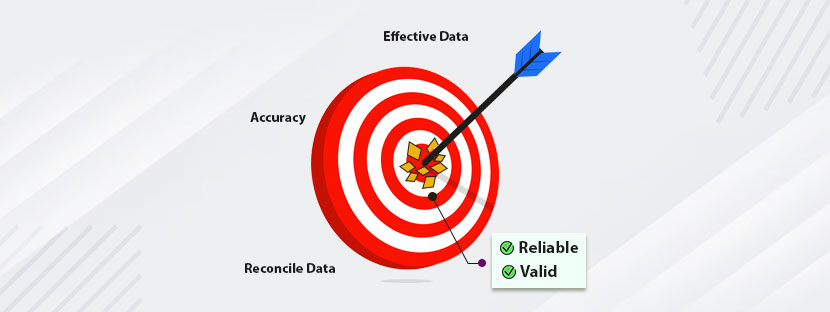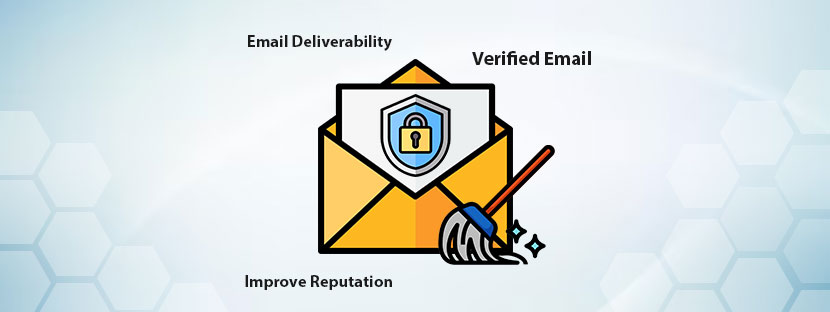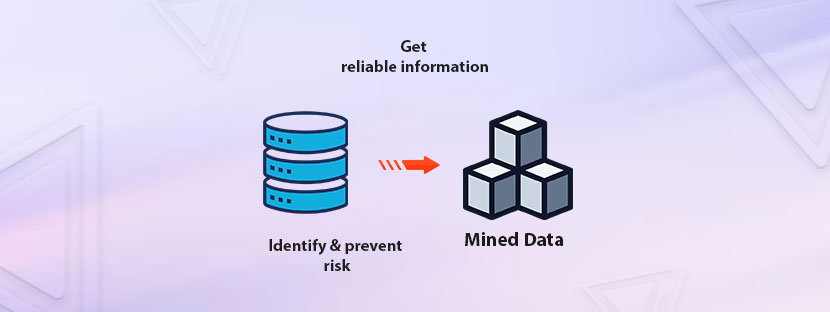In This Article
- What is scrubbed data and scrubbing mean
- Why Is Data Scrubbing Important?
- Keys to Identify Company Data for Cleanup
- Common Problems with Dirty Data
- Common Problems with Dirty Data
- Steps to Effective Data Scrubbing
- Follow these steps for efficient data scrubbing:
- How Data Scrubbing Benefits B2B Companies
- Conclusion
What if all your expensive data didn’t work at the right time? You might spend all your resources on that but it just refuses to pay you a decent return. Let me tell you, it’s very common and it can be easily avoidable. You just have to rely on a data scrubbing process to get your data ready to implement.
One thing you must notice here is that data cleansing and data scrubbing both look similar but they are different. While the former is more general in nature while the latter is much more intense. We’ll explore database scrubbing and the role of data scrubbers in this blog in more detail.
What is scrubbed data and scrubbing mean
Data scrubbing means cleaning your data for accuracy. It removes errors, duplicates, and irrelevant entries. Clean data ensures smooth operations and informed decisions. For B2B companies, this is crucial for better efficiency.
Why Is Data Scrubbing Important?
Accurate data drives better business decisions. Dirty data causes confusion and errors. B2B companies handle massive amounts of data daily. Without scrubbing, outdated or incorrect data creeps in. This reduces productivity and wastes valuable resources. Clean data ensures you target the right audience effectively. It enhances communication with clients and partners. It also improves data analysis for strategic decisions.
Keys to Identify Company Data for Cleanup
Every single piece of data comes up with an expiry date. As an organization, you need to keep updating your database on time to get the most out of it. If you do not do it on time, it will produce dirty data in your system. Piling up dirty data can cause many issues in your system. Let’s discuss them.
Common Problems with Dirty Data
Dirty data can harm your business in many ways. First of all, it decreases the potentiality of your data and eventually, decreases your business value. Data becomes dirty for many specific reasons. However, all reasons end up harming your business potential. Here are the common issues that dirty data can create for your business.
Common Problems with Dirty Data
Dirty data can harm your business in many ways. First of all, it decreases the potentiality of your data and eventually, decreases your business value. Data becomes dirty for many specific reasons. However, all reasons end up harming your business potential. Here are the common issues that dirty data can create for your business.
- Duplicate entries lead to redundant efforts.
- Incorrect data affects decision-making processes.
- Missing information creates incomplete client profiles.
- Outdated records harm marketing campaigns.
- Irrelevant entries clutter your database.
These issues cost time, money, and reputation. Over the course of business, if dirty data keeps piling up in the system. However, data scrubbing can help here. It usually fixes all these problems effectively.
Steps to Effective Data Scrubbing
Follow these steps for efficient data scrubbing:
1. Audit Your Data
Start with a complete review of your database. Identify errors, duplicates, and missing entries. Understand the scope of cleaning required.
For instance, scan for duplicate customer records or outdated contact details. This gives you a clear picture of the cleanup task.
2. Standardize Data Formats
Ensure consistency across all records. Standardize dates, addresses, and names. This reduces mismatches and confusion.
For example, use a uniform date format like YYYY-MM-DD across all records. This avoids errors during data analysis.
3. Remove Duplicate Entries
Identify and delete duplicate records. Use tools or software for accurate detection. Duplicate entries create redundancy and waste resources.
4. Correct Errors
Fix typos, incorrect values, and formatting issues. Ensure all information matches verified sources. This step enhances data reliability.
5. Fill in Missing Data
Complete incomplete records using reliable sources. Reach out to clients if needed. Accurate data improves decision-making and client interactions.
6. Validate Data Regularly
Validate your database periodically. Keep information accurate and updated. Regular checks prevent issues from accumulating over time.
How Data Scrubbing Benefits B2B Companies
Data scrubbing streamlines your operations. It boosts efficiency and accuracy. Scrubbing datasets one after another immensely benefits companies in many areas. Here’s how it helps:
- Enhances marketing efforts with accurate client segmentation.
- Improves customer communication and satisfaction.
- Reduces operational costs by removing duplicate efforts.
- Strengthens data analysis for strategic insights.
- Ensures compliance with data protection regulations.
Clean data means clean operation and clean results. By scrubbing data, businesses save time and resources. Data scrubbers overwhelmingly clean out the entire operations and ensure complete outcomes. This means better outcomes for every department.
The Role of Data Scrubbing in B2B Success
Data scrubbing plays a critical role in B2B growth. It builds trust with accurate and reliable information. Clean data enhances decision-making and boosts efficiency. It helps in delivering personalized experiences to clients. This improves brand reputation and customer loyalty.
What does the data scrubber do
Data scrubbers are the professionals who take up the task of data cleansing and scrubbing. They usually perform most of their tasks using an efficient tool to maintain the quality of the data. Primarily, they identify and correct errors within the datasets. And they perform regular data cleansing tasks like removing duplicates, fixing formatting issues, etc tasks. Their aim is to make your data clean and accurate.
With clean data, B2B companies can scale operations faster. They can also adapt better to market changes. Data scrubbing ensures they stay ahead in a competitive landscape.
Conclusion
Data scrubbing is essential for all B2B companies. It improves efficiency, accuracy, and decision-making. By following the steps and practices mentioned, you can clean your data effectively. Use the right tools and stay consistent in your efforts. Start scrubbing your data today to unlock better business outcomes. Clean data means a stronger, more successful future for your company.
At AskDataEntry, we take immense care of data cleansing and data scrubbing matters for B2B companies. We have a total of 10 years experience of providing data entry services across the globe. You can choose us to get your data cleaned at the optimal level.











